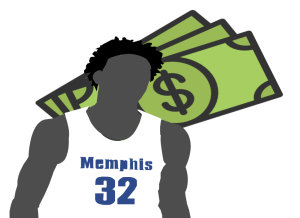The NCAA handed down a 12 game suspension to the No. 1 overall recruit in the class of 2019, University of Memphis center James Wiseman on Nov. 20. The suspension is a result of the discovery made by the NCAA that Memphis Head Coach Penny Hardaway paid Wiseman’s mother $11,500 in 2017 to cover moving expenses.
In addition to the suspension, the NCAA is requiring that Wiseman donate $11,500 to a charity of his choice.
In 2008, Hardaway donated $1 million to the University of Memphis to help build the Penny Hardaway Athletic Hall of Fame, making him a booster by NCAA definition.

And while the payment to Wiseman’s mother was made before Hardaway was hired to be head coach at Memphis, under NCAA rules, boosters are not allowed to give financial assistance to any prospective student athletes or their families.
In my opinion, Wiseman’s punishment from the NCAA is unwarranted.
For one thing, I think the punishment Wiseman is receiving does not fit the crime, a crime that he did not even commit. Because of the rules that he violated, Wiseman is being forced to miss a good portion of this season, which is a crucial one for his life after college.
Right now, Wiseman is projected to be high in the next NBA draft, potentially first overall, and missing time this season could hurt his draft stock and his future as a basketball player.
This suspension is unwarranted because in this case, the NCAA is enforcing a rule that is outdated. Right now, more and more states are voting to allow college athletes to be paid for their names, images and likenesses.
In the case of Wiseman, he is being punished for receiving money from an influential figure in a big name program. To me, this will be the direction that all college sports are heading, and the NCAA should stop wasting their time and hurting players’ careers by enforcing technicalities.
Wiseman’s suspension is unjust because the transaction did not even involve him. The exchange of the money was between Hardaway and Wiseman’s mother, so why is Wiseman himself the one being punished?
The blame should fall on Hardaway, because he is the one who should have known better than to offer monetary assistance to a prospective athlete’s family given the amount of influence he had on Memphis’ basketball program at the time.
Overall, the NCAA’s ruling on Wiseman’s suspension is an outdated response to a modern situation. As college sports continue to evolve, and rules regarding players receiving money are changed, the NCAA will have to modernize their rulebook to avoid petty disputes like this one.











































